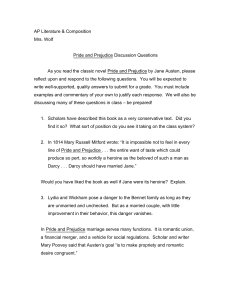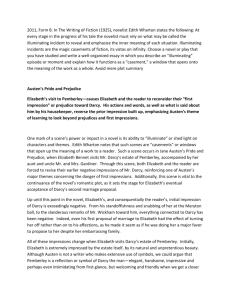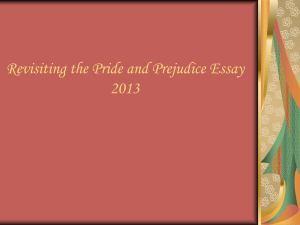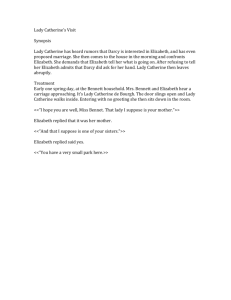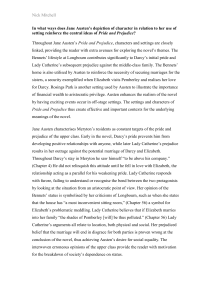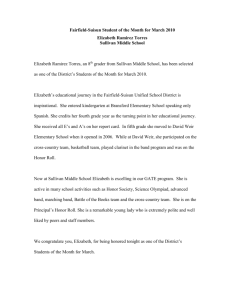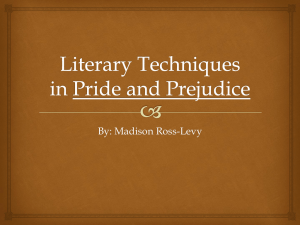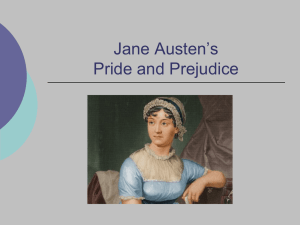Pride and Prejudice - Conservative Text
advertisement
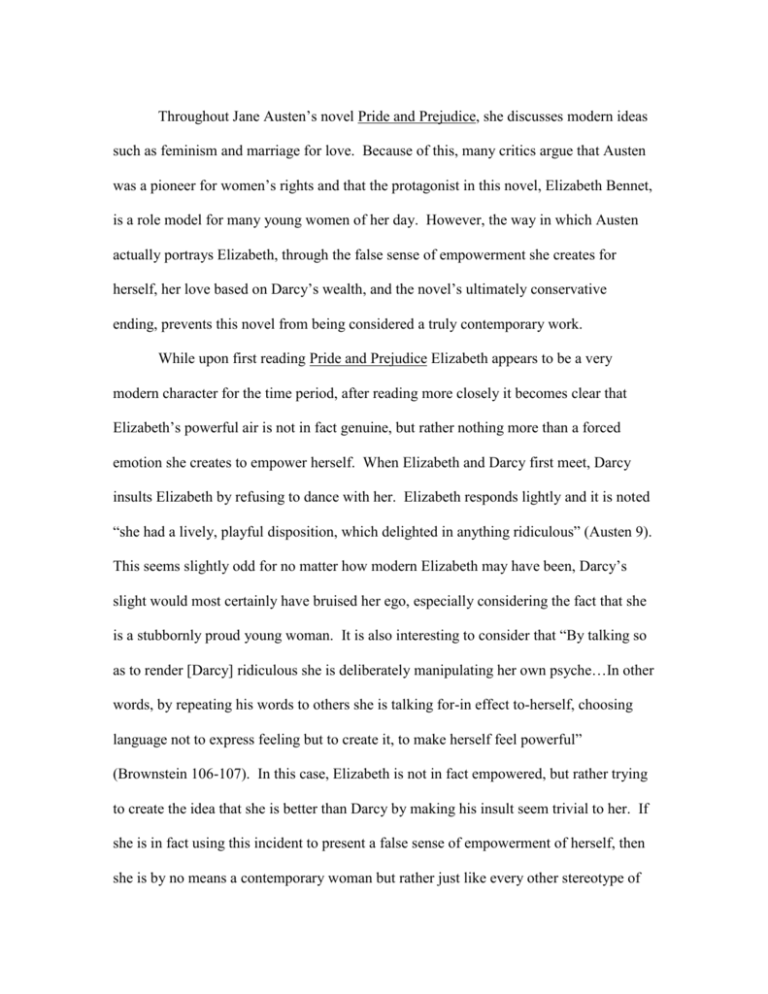
Throughout Jane Austen’s novel Pride and Prejudice, she discusses modern ideas such as feminism and marriage for love. Because of this, many critics argue that Austen was a pioneer for women’s rights and that the protagonist in this novel, Elizabeth Bennet, is a role model for many young women of her day. However, the way in which Austen actually portrays Elizabeth, through the false sense of empowerment she creates for herself, her love based on Darcy’s wealth, and the novel’s ultimately conservative ending, prevents this novel from being considered a truly contemporary work. While upon first reading Pride and Prejudice Elizabeth appears to be a very modern character for the time period, after reading more closely it becomes clear that Elizabeth’s powerful air is not in fact genuine, but rather nothing more than a forced emotion she creates to empower herself. When Elizabeth and Darcy first meet, Darcy insults Elizabeth by refusing to dance with her. Elizabeth responds lightly and it is noted “she had a lively, playful disposition, which delighted in anything ridiculous” (Austen 9). This seems slightly odd for no matter how modern Elizabeth may have been, Darcy’s slight would most certainly have bruised her ego, especially considering the fact that she is a stubbornly proud young woman. It is also interesting to consider that “By talking so as to render [Darcy] ridiculous she is deliberately manipulating her own psyche…In other words, by repeating his words to others she is talking for-in effect to-herself, choosing language not to express feeling but to create it, to make herself feel powerful” (Brownstein 106-107). In this case, Elizabeth is not in fact empowered, but rather trying to create the idea that she is better than Darcy by making his insult seem trivial to her. If she is in fact using this incident to present a false sense of empowerment of herself, then she is by no means a contemporary woman but rather just like every other stereotype of her time: a woman who is seeking to appear intelligent and proud when in fact she is an unsure follower. One of the clearest examples that proves this novel is not fully contemporary is the way in which the book ends: with Elizabeth marrying Darcy, a man she claimed to have hated, mainly for the fact that he is wealthy. Throughout the novel, Elizabeth is at constant war with Darcy, always allowing her pride and his insults to cause her to hate him and to exclaim that one of the worst things in the world would be “To find a man agreeable whom one is determined to hate!” (Austen 78). She seems so determined to dislike him simply based on how she judged him when they first met that she is completely unwilling to consider the fact that she may have misjudged him. However, her feelings completely change when she visits Pemberley, his home. Upon first viewing the mansion, Austen notes that Elizabeth “felt that to be mistress of Pemberley might be something!” (Austen 207). Considering that no other words have been exchanged between Elizabeth and Darcy up until this point, it is easy to presume that her change of heart is largely affected by his home. It most certainly cannot be the simple fact that his housekeep, Ms. Reynolds, portrays him in such a favorable light; Elizabeth would not believe that Darcy was a good man when Mr. Bingley, a very gentle and kind friend of her sisters, professed him to be a good man, therefore it does not make sense that she would believe a woman hired by Darcy and thus somewhat obligated to speak highly of him. Even if Elizabeth did completely change her mind of Darcy based on Ms. Reynold’s exclamations, this does not prove that Elizabeth is a modern women, but rather that she can be easily persuaded whenever she believes she can trust someone. It is important to note that “When we consider that she finds herself drawn to the idea of being Darcy’s wife before her renewed contract with the man himself, we must conclude that Darcy’s social attractiveness plays a large part in the awakening of her desire” (Paris 36). Because Elizabeth begins to change her opinion of Darcy before she views his kind treatment of her aunt and uncle, it is quite plausible that she was so entranced by his wealth and home that she saw what she wanted in his personality and disregarded any flaws that she had previously been so fixated with. By interpreting Elizabeth’s actions in this way, it is impossible to call her a modern character. Her focus on wealth is far too great for her to be anything more than a stereotypical woman of her time period. While it is possible to argue that most of the novel is contemporary in its own way, the ending, in which Elizabeth gives in to societal expectations and marries Darcy, simply proves that she is not a woman who makes choices based on emotions but rather adjusts her life according to what will most benefit her family and herself financially. One of the most important things that Elizabeth mentioned after Darcy paid Wickham to marry Lydia was that Darcy “was the person to whom the whole family were indebted for the first of benefits, and whom she regarded herself with an interest, if not quite so tender, at least as reasonable and just as what Jane felt for Bingley” (316). Elizabeth does not say that she loves Darcy, but simply that she is indebted to him and feels gratitude for his enormous generosity to her family. This does not support the modern belief of the time that one should marry for love, for Elizabeth is only granting Darcy’s wish of marriage because she owes him for saving her family’s name. While Darcy loves Elizabeth, this feeling is not wholly or genuinely reciprocated and therefore it is impossible to consider Elizabeth a modern heroine. It must also be noted that “If [Elizabeth] learns things in the course of the novel, these are not fundamental values and forms of behavior but elaborations upon what she already knows or suspects. In this, she differs from Darcy who must undergo a radical re-adjustment so as to become, at last, a suitable companion for her” (Cohen). This certainly does not fit in with a modern ending for a novel of the time period, for Darcy should not have to change in order to fit into the status quo set forth by society. If this was a truly contemporary story, Darcy and Elizabeth would be able to be together without needing to change aspects of their personality. The fact that they must change is evident when Elizabeth tells Darcy “You must learn some of my philosophy. Think only of the past as its remembrance gives you pleasure” (Austen 317). Firstly, this is obviously contradictory to the modern belief mentioned above, that a couple should not have to change for each other. Also, while Elizabeth’s “philosophy” may seem rational at first, when viewed more closely it is clearly a childish view of the world. To only remember happy, frivolous times from one’s past, she is insinuating that she is a shallow person who is not interested in learning from the past but would rather remember trivial occurrences that bring her delight. This is most certainly not the belief of a modernized, intellectual woman and therefore does not add to any type of contemporary feminist theme. Only adding to the conventional ending is the fact that Elizabeth and Darcy move to Pemberley, the epitome of upperclass society standards in the book. When one considers that “Pemberley…evolves at the end of the novel into a utopic community where Elizabeth and Darcy can live and entertain according to socially and sexually democratic values” (Cohen), it is clear that the novel does not contain a contemporary theme but in fact justifies living up to society’s expectations. Pemberley represents exactly what society would recommend for someone in Elizabeth’s position to desire, and by attaining it Elizabeth is simply giving in to what society expects of her. Because she ultimately marries Darcy to please those around her and to gain what she has been predisposed to want, it is impossible to suggest that Elizabeth marries him out of love and affection. Essentially, this novel is not about any type of contemporary idea concerning marriage or love; in actuality, it is about meeting the status quo and living up to the expectations set by an obscure society. From Elizabeth’s feigned liberation, her hidden love of wealth, and her definitive decision to marry Darcy out of debt, it is quite clear that she does not represent a feminist woman. While Austen intended for Elizabeth to be just this and even may have been successful on the surface, when one delves deeper into the story it is quite clear that Elizabeth is nothing more than another product of her society; she is simply more skilled at hiding her true intentions than others around her. Works Cited Brownstein, Rachel M. “Jane Austen: Irony & Authority”. Bloom’s BioCritiques: Jane Austen. Chelsea House Publishers: Philadelphia; 2002 Paris, Bernard J. Readings on Jane Austen: Pride and Prejudice. Greenhaven Press, Inc. San Diego: 1999. Cohen, Paula Marantz. “Jane Austen’s Rejection of Rousseau: A Novelistic and Feminist Initiation. Papers on Language and Literature. Edwardsville: Summer 1994. Vol. 30, Iss. 3; pg. 215
